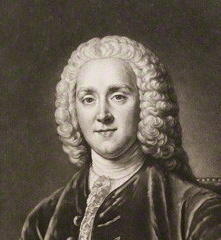Lord Chesterfield Quotes - Page 9
The permanency of most friendships depends upon the continuity of good fortune.
Lord Philip Dormer Stanhope Chesterfield, Philip Dormer Stanhope Earl of Chesterfield (1855). “The Works of Lord Chesterfield: Including His Letters to His Son, Etc : to which is Prefixed, an Original Life of the Author”, p.630
Frequent and loud laughter is the characteristic of folly and ill manners.
Lord Chesterfield, David Roberts (2008). “Lord Chesterfield's Letters”, p.72, Oxford University Press
Unlike my subject will I frame my song, It shall be witty and it shan't be long.
Epigram on 'Long' Sir Thomas Robinson in the 'Dictionary of National Biography'
Lord Chesterfield, David Roberts (2008). “Lord Chesterfield's Letters”, p.201, Oxford University Press
Human nature is the same everywhere; the modes only are different.
Lord Chesterfield (1998). “Lord Chesterfield's Letters”, p.416, OUP Oxford
He adorned whatever subject he either spoke or wrote upon, by the most splendid eloquence.
"Character of Bolingbroke"; reported in "Bartlett's Familiar Quotations", 10th ed. (1919),
Lord Chesterfield (2008). “The Modern Chesterfield”, p.78, Wildside Press LLC
The vulgar only laugh, but never smile; whereas well-bred people often smile, but seldom laugh.
Letter to his son, February 17, 1754.
You must embrace the man you hate, if you cannot be justified in knocking him down.
Lord Philip Dormer Stanhope Chesterfield, Philip Dormer Stanhope Earl of Chesterfield (1855). “The Works of Lord Chesterfield: Including His Letters to His Son, Etc : to which is Prefixed, an Original Life of the Author”, p.499
Lord Chesterfield (1998). “Lord Chesterfield's Letters”, p.292, OUP Oxford
Lord Chesterfield (2008). “The Modern Chesterfield”, p.76, Wildside Press LLC
Lord Chesterfield, David Roberts (2008). “Lord Chesterfield's Letters”, p.296, Oxford University Press
Letters to His Son on the Art of Becoming a Man of the World and a Gentleman, February 5, 1750.
Lord Chesterfield, David Roberts (2008). “Lord Chesterfield's Letters”, p.302, Oxford University Press







